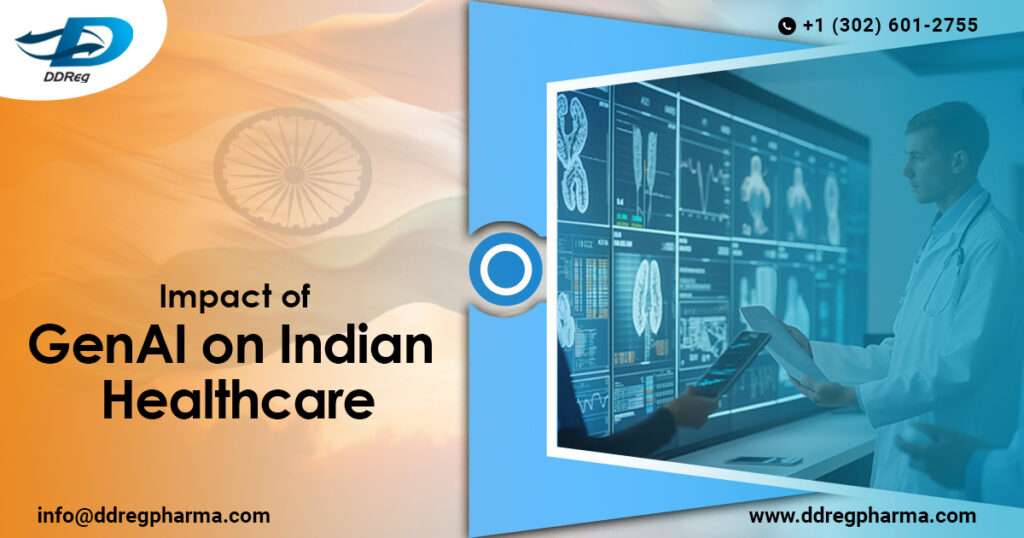The Indian healthcare system has been traditionally plagued by challenges such as inadequate infrastructure, limited access to quality care, and a shortage of skilled professionals, is witnessing a paradigm shift with the advent of Generative Artificial Intelligence (GenAI).
GenAI is an AI subset dedicated to the creation of new content by learning patterns from existing data. Traditional AI, whose key role is data analysis with predictions, is different from GenAI, which generates new content in the form of text, images, audio, or video. This makes it easy for natural language processing to allow human-like interactions without users having technical knowledge. These technological advancements are reshaping the healthcare landscape, promoting a “phygital” (physical and digital) approach that enhances patient care and operational efficiency.
Patient Experience and Personalized medicine
GenAI can enable the processing and analysis of vast amounts of data generated from various sources, including medical history records, laboratory tests, and wearables, in order to produce more accurate diagnoses and personalized treatment plans. For instance, it can create discharge summaries in a patient’s native language and make real-time clinical notes, greatly enriching the patient experience while reducing administrative burdens.
GenAI can enable processing and analysis of vast amounts of data generated from various sources. These include medical history records, laboratory tests and wearables. These capabilities produce more accurate diagnoses and personalized treatment plans. For instance, it can create discharge summaries in the patient’s native language. It also makes real-time clinical notes. This greatly enriches the patient’s experience. It reduces administrative burdens.
The integration of Natural Language Processing (NLP) into GenAI systems will help to accelerate access to relevant information and therefore improve health-related services and decision-making. This would be useful in a socio-economic system like India, where large numbers of patients and limited resources tend to burden the healthcare system.
Operational Excellence
One of the critical challenges in the Indian healthcare system is enhancing operational efficiency, predicting patient demands, and optimizing staff allocation. GenAI can address these issues by providing intelligent insights and automating various processes. This leads to better resource management and reduces administrative burdens, ultimately resulting in cost savings and improved patient care.
The ability of GenAI to learn from unstructured data, such as clinical notes and patient interactions, further augments its utility in healthcare. By synthesizing this information, GenAI can assist healthcare providers in developing targeted interventions and recommendations, thereby improving patient outcomes and affordability.
Medical Research and Drug Discovery
GenAI technology quickly analyzes vast datasets increasing the pace by which the identification for possible cures and development of new drugs can be fast-tracked. This can thereby reduce the timing and costs associated with clinical trials and drug development.
Moreover, GenAI can make medical imaging and diagnostics better and faster. With more accurate, detailed analysis, healthcare professionals would be able to make more informed decisions for maintaining better care and outcomes for the patients.
Future of GenAI in India
The future of GenAI in Indian healthcare looks promising, with projections indicating significant market growth. According to a report by PwC India, the GenAI market in India is expected to reach USD 1.18 billion by 2024 and grow at a compound annual growth rate of 23.56%, potentially reaching USD 4.20 billion by 2030. This growth reflects the increasing adoption of GenAI solutions across various healthcare applications, from clinical decision support to patient engagement tools.
The Indian healthcare sector is well-positioned to leverage GenAI, with country’s advanced digital infrastructure and supportive government initiatives programs such as the National AI Mission and the Responsible AI for Youth initiative aim to promote AI development and integration across various sectors, including healthcare.
Conclusion
GenAI can bring about momentous transformation in the Indian health ecosystem—a huge potential for the betterment of patient care, operational efficiency, and medical innovation. However, much depends on how critical challenges that lie with data privacy, ethical considerations, and building a proper infrastructure are addressed. With continued research, investment into parity, and commitment to responsible AI practices can lead a long way toward making high-quality and accessible healthcare a reality in India, envisioning an effective and patient-centered healthcare system.
With experience spanning over 120 regulatory agencies and unmatched subject matter expertise, DDReg is your trusted partner for pharmaceutical regulatory and pharmacovigilance services. Discover more insights from the experts on Artificial Intelligence: Machine Learning and Simulations to Facilitate Clinical Trials
References & Further Reading
- Understanding the impact of GenAI on the Indian healthcare ecosystem, 2024, PwC India.
- Yelne S, Chaudhary M, Dod K, Sayyad A, Sharma R. Harnessing the Power of AI: A Comprehensive Review of Its Impact and Challenges in Nursing Science and Healthcare. Cureus. 2023 Nov 22;15(11):e49252. doi: 10.7759/cureus.49252. PMID: 38143615; PMCID: PMC10744168.

